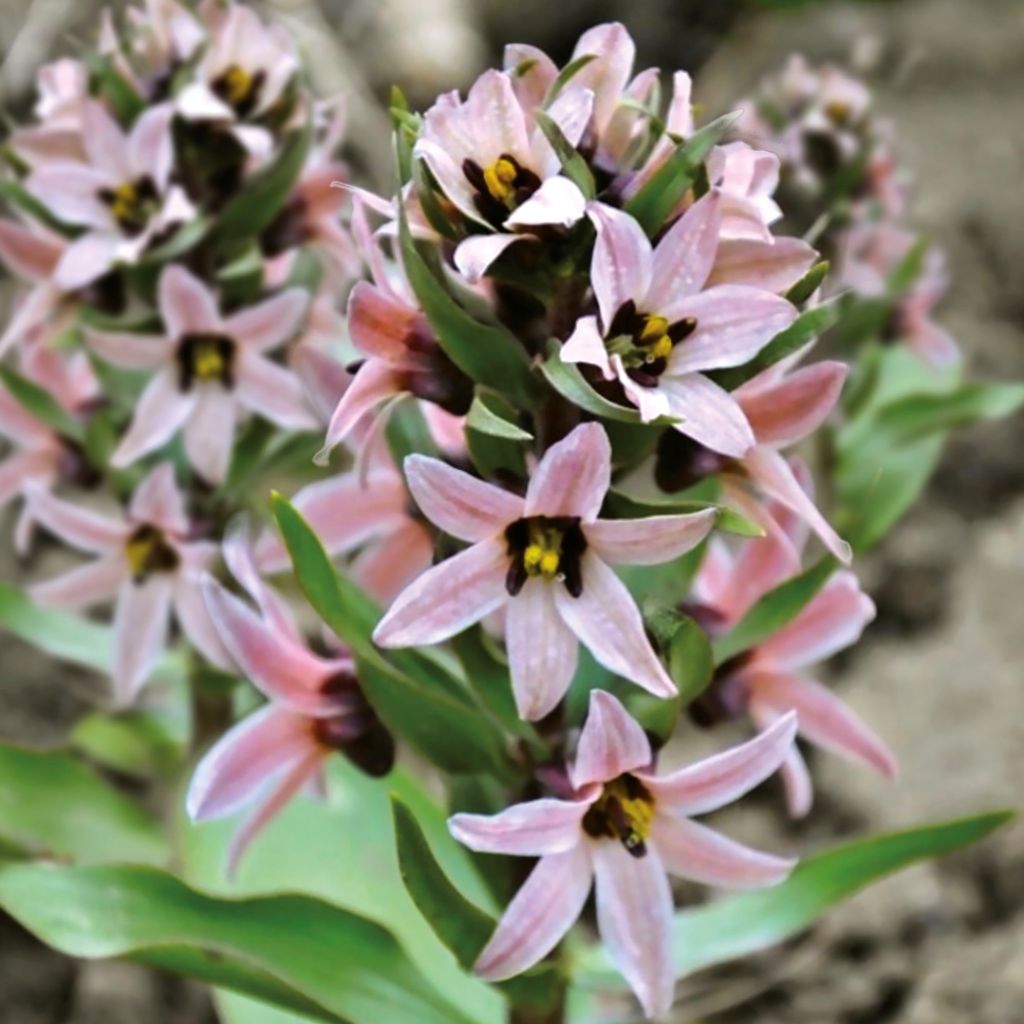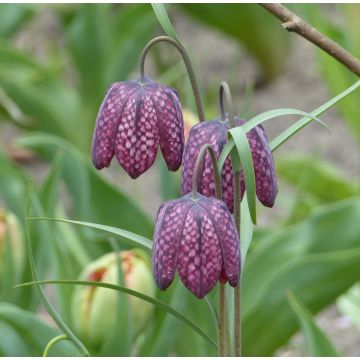

Fritillaria stenanthera
Fritillaria stenanthera
Fritillaria stenanthera
narrow anther Fritillary
Special offer!
Receive a €20 voucher for any order over €90 (excluding delivery costs, credit notes, and plastic-free options)!
1- Add your favorite plants to your cart.
2- Once you have reached €90, confirm your order (you can even choose the delivery date!).
3- As soon as your order is shipped, you will receive an email containing your voucher code, valid for 3 months (90 days).
Your voucher is unique and can only be used once, for any order with a minimum value of €20, excluding delivery costs.
Can be combined with other current offers, non-divisible and non-refundable.
Why not try an alternative variety in stock?
View all →This plant carries a 6 months recovery warranty
More information
We guarantee the quality of our plants for a full growing cycle, and will replace at our expense any plant that fails to recover under normal climatic and planting conditions.
Would this plant suit my garden?
Set up your Plantfit profile →
Description
The Fritillaria stenathera is a very beautiful wild fritillary that blooms from the end of winter in the mountains of Central Asia, between 1000 and 2000 meters (3281 and 6562 feet) above sea level. Sought after by collectors, still very rare in gardens, this species is characterized by an early and delightful flowering, made up of star-shaped flowers in apricot pink with a violet base. Although it requires delicate cultivation, this fritillary is very resistant to cold, but it requires a well-drained, rocky soil that is dry in winter and summer. Easier to maintain in a pot, it is not forbidden to try to acclimate it in a rock garden or a raised bed, if care is taken to place it in the sun, in a soil that does not retain water.
The Fritillaria stenathera (formerly known as Rhinopetalum stenantherum) belongs to the Lily family. It is native to an area including the western part of the Tian Shan mountains in Turkestan and the Alai mountains located on the border between Kyrgyzstan and Tajikistan. It is a plant that originates from relatively dry mountain environments in winter, where it can be found growing in sun-exposed scree. From its origins, it can be deduced that this species fears excessive humidity, as well as heat in summer.
The plant develops from a scaly bulb from the end of winter. The buds emerge from the ground in February-March, then quickly elongate to produce leaves and floral stems that will reach approximately 25 cm (10in) in height at the time of flowering, in March-April. Each floral stem bears 2 to 8 small star-shaped flowers. Each flower is composed of 6 iridescent petals in salmon pink colour, with a purple-violet base. The center of the flower is also purple-violet in colour. After pollination, an upright fruit forms, which will release numerous flat seeds at maturity. The leaves of this Fritillaria stenathera are bright green. The two basal leaves are wide, almost opposite, elliptical to oblong-lanceolate and much larger than the upper leaves, which are linear-lanceolate in shape. The above-ground vegetation disappears in summer, and the plant goes into dormancy. During this time of year, the soil should be rather dry.
This fritillary truly deserves to be discovered, it is still a botanical treasure that will delight enthusiasts. Give it a good place in a rock garden or a bed that does not retain water, neither in winter nor in summer, for example against the house, sheltered from winter rains. Since this small bulbous plant fears competition, it is preferable not to choose vigorous companions for it. Early-flowering small bulbs such as narcissus, botanical tulips, or crocuses will be perfect.
Report an error about the product description
Plant habit
Flowering
Foliage
Botanical data
Fritillaria
stenanthera
Liliaceae
narrow anther Fritillary
Central Asia
Planting and care
The Stenanthera Fritillary thrives in full sun. It ideally thrives in a continental (or montane) climate where winters and summers are dry and springs are humid. Plant it in fertile and well-drained soil, for example in a rock garden with a mixture of potting soil and fine gravel. If the drainage is insufficient, the fritillary may rot, both in winter and in summer. Plant it as soon as possible, from September to October, by adding sand, stones or pumice to the planting hole, and plant it in a raised bed (25 cm (10in) elevation is sufficient). Place the bulb at a depth of 8 cm (3in).
In winter, we recommend mulching the fritillary, firstly to protect it from the cold, but especially from excessive moisture. Remove faded flowers if you do not want them to self-seed. Do not water your fritillaries in summer and winter. If the soil is too dry in spring, lightly water to start the bulb, but always without excess.
Planting period
Intended location
Care
This item has not been reviewed yet - be the first to leave a review about it.
Haven't found what you were looking for?
Hardiness is the lowest winter temperature a plant can endure without suffering serious damage or even dying. However, hardiness is affected by location (a sheltered area, such as a patio), protection (winter cover) and soil type (hardiness is improved by well-drained soil).

Photo Sharing Terms & Conditions
In order to encourage gardeners to interact and share their experiences, Promesse de fleurs offers various media enabling content to be uploaded onto its Site - in particular via the ‘Photo sharing’ module.
The User agrees to refrain from:
- Posting any content that is illegal, prejudicial, insulting, racist, inciteful to hatred, revisionist, contrary to public decency, that infringes on privacy or on the privacy rights of third parties, in particular the publicity rights of persons and goods, intellectual property rights, or the right to privacy.
- Submitting content on behalf of a third party;
- Impersonate the identity of a third party and/or publish any personal information about a third party;
In general, the User undertakes to refrain from any unethical behaviour.
All Content (in particular text, comments, files, images, photos, videos, creative works, etc.), which may be subject to property or intellectual property rights, image or other private rights, shall remain the property of the User, subject to the limited rights granted by the terms of the licence granted by Promesse de fleurs as stated below. Users are at liberty to publish or not to publish such Content on the Site, notably via the ‘Photo Sharing’ facility, and accept that this Content shall be made public and freely accessible, notably on the Internet.
Users further acknowledge, undertake to have ,and guarantee that they hold all necessary rights and permissions to publish such material on the Site, in particular with regard to the legislation in force pertaining to any privacy, property, intellectual property, image, or contractual rights, or rights of any other nature. By publishing such Content on the Site, Users acknowledge accepting full liability as publishers of the Content within the meaning of the law, and grant Promesse de fleurs, free of charge, an inclusive, worldwide licence for the said Content for the entire duration of its publication, including all reproduction, representation, up/downloading, displaying, performing, transmission, and storage rights.
Users also grant permission for their name to be linked to the Content and accept that this link may not always be made available.
By engaging in posting material, Users consent to their Content becoming automatically accessible on the Internet, in particular on other sites and/or blogs and/or web pages of the Promesse de fleurs site, including in particular social pages and the Promesse de fleurs catalogue.
Users may secure the removal of entrusted content free of charge by issuing a simple request via our contact form.
The flowering period indicated on our website applies to countries and regions located in USDA zone 8 (France, the United Kingdom, Ireland, the Netherlands, etc.)
It will vary according to where you live:
- In zones 9 to 10 (Italy, Spain, Greece, etc.), flowering will occur about 2 to 4 weeks earlier.
- In zones 6 to 7 (Germany, Poland, Slovenia, and lower mountainous regions), flowering will be delayed by 2 to 3 weeks.
- In zone 5 (Central Europe, Scandinavia), blooming will be delayed by 3 to 5 weeks.
In temperate climates, pruning of spring-flowering shrubs (forsythia, spireas, etc.) should be done just after flowering.
Pruning of summer-flowering shrubs (Indian Lilac, Perovskia, etc.) can be done in winter or spring.
In cold regions as well as with frost-sensitive plants, avoid pruning too early when severe frosts may still occur.
The planting period indicated on our website applies to countries and regions located in USDA zone 8 (France, United Kingdom, Ireland, Netherlands).
It will vary according to where you live:
- In Mediterranean zones (Marseille, Madrid, Milan, etc.), autumn and winter are the best planting periods.
- In continental zones (Strasbourg, Munich, Vienna, etc.), delay planting by 2 to 3 weeks in spring and bring it forward by 2 to 4 weeks in autumn.
- In mountainous regions (the Alps, Pyrenees, Carpathians, etc.), it is best to plant in late spring (May-June) or late summer (August-September).
The harvesting period indicated on our website applies to countries and regions in USDA zone 8 (France, England, Ireland, the Netherlands).
In colder areas (Scandinavia, Poland, Austria...) fruit and vegetable harvests are likely to be delayed by 3-4 weeks.
In warmer areas (Italy, Spain, Greece, etc.), harvesting will probably take place earlier, depending on weather conditions.
The sowing periods indicated on our website apply to countries and regions within USDA Zone 8 (France, UK, Ireland, Netherlands).
In colder areas (Scandinavia, Poland, Austria...), delay any outdoor sowing by 3-4 weeks, or sow under glass.
In warmer climes (Italy, Spain, Greece, etc.), bring outdoor sowing forward by a few weeks.






























